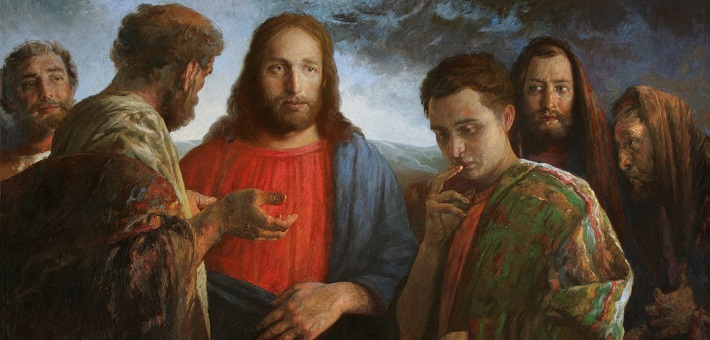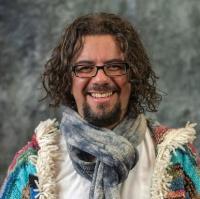Commentary on Mark 10:17-31
Jesus and his disciples had left their resting place and moved on, meeting crowds again and continuing with his teachings. Again the children were key to his understanding of the kin-dom of God.
In this text, a rich young man comes to see Jesus. He addresses Jesus as “good teacher,” which was an honorable form of address. In John 13:13 Jesus says he is a teacher. But as for being “good,” Jesus knows better. Only God is good.
The rich man seeks Jesus because he wants guidance and assurance. Jesus tells him about the precepts, the commandments, what is in the law, and he responds that he has been doing all of that his entire life. He is truly a pious man—so much so that Jesus is deeply moved by his sincerity and desire to fully live the law. Jesus loves him so much that he wants him to be in his group; so much that he invites him to join them. But one thing is missing for this man: to detach his heart from what holds it—his riches. Jesus’ call is a challenge for him to go to a deeper place of living these practices.
When he came searching for Jesus, he wanted more; he wanted an assurance for the life to come, a certainty that he was on the right path. And Jesus says yes, he is on the right path, but there is something that needs to happen: a leap of faith, a full detachment from what holds his life together.
Among the various interpretations of this story, perhaps we can do a psychological reading on the rich man. If so, we can say that this man knew he had reached the fullness of his practices and something was pulling him further, to truly experience a deeper life. That’s when Jesus comes into the picture. Jesus is known for his radical teachings, and this man goes to him exactly for what Jesus is going to say. Perhaps he knows himself so well that he knows where he needs to go, and Jesus is indeed the answer. As Jan Van Ruysbroeck says, “Self-knowledge teaches us whence we come, where we are and whither we go.”1
But then the unexpected happens. For the fullness of his desire to be realized, he has to do something he didn’t anticipate. Jesus says: “Only one thing is missing for you to get where you want to go. Give up your source of trust and trust me. Come follow me, and we will figure out life together.” Oh, that was way too much. He was ready for anything but this.
Let us ponder this path Dorothee Soelle shows, citing Dionysius, from a Neoplatonist influence to define mysticism: “purgatio, illuminatio, and unio … purification, illumination, and union (or perfection).”2
Let us now imagine that the rich man had reached purification by focusing on the commandments; he had also reached illumination by repeating these practices time and again. Now he needs the final moment: Union! Perfection! Union with the very core of that in which he found purification and illumination. Thus, as a continuation, he had to give away all he had as a way to find perfection of the heart, union with the source of all things: God. Now without trusting his richness, he would be free—truly free.
But how difficult a leap of faith is. It is often too much to handle. In order to go to that place, we need to leave that which holds us. We have to let what holds us die, and then we must fall. Only a sense of death can open up the possibility of transformation, the reinvention of ourselves. Without the sense of death, we will never move. To be reinvented, we need to face death and allow the new to spring forth and make us anew.
To let go of his riches was to let go of a whole sense of self, of who he was, and embrace a new form of being in the world. The rich man would have to experience that change as a freefall until, now reinventing himself within the group of Jesus, he would turn the sense of falling to a sense of flying.
What Jesus proposes to this man is what Jesus is proposing for all of us! The gospel is much less about what we think it is and much more about what we are unwilling to do. If the gospel is indeed about giving up our riches, we are all very far from being a Christian. We must continue pushing our own spiritual and material limits until we are able to detach our hearts from our possessions and turn ourselves to a simple way of living for the sake of others and God.
A Neoplatonic reading of the rich man tries to understand his longings. However, our attachment to money seems to be a hard thing to let go. That is why, following Jesus’ words to the rich man, no rich person will go to heaven. It is easier for a camel to go through a needle … because to be rich is the very contradiction of the gospel. The gospel is about conversion from a trust elsewhere to trust in God, about a leap of faith that makes us care about, and share everything with, others. Christianity can be a journey through purification, illumination, and union. If so, what is left for us can be this set of questions:
How purified of our intentions are we?
How illuminated with the awareness of others, of the earth, of our care for others are we?
How can we jump and be unified with God right here, right now?
Or in one sentence: What are the calls to conversion that Jesus has given us, that we were not able to listen to or follow?
Notes
- Quoted in Dorothee Soelle, The Silent Cry: Mysticism and Resistance (Minneapolis: Fortress Press, 2001), 77.
- Soelle, The Silent Cry, 180.
PRAYER OF THE DAY
Lord of abundant riches, when asked to give everything to follow Jesus, a rich man faltered. Give us the courage to give everything that we have to you, knowing that what you offer is more valuable than all the riches in the world. Amen.
HYMNS
Jesus calls us; o’er the tumult ELW 696, GG 720, H82 549/550, UMH 398, NCH 171/172
The glory of these forty days ELW 320, GG 165, H82 143
CHORAL
Lord, whose love in humble service, Cathy Moklebust (handbells)


February 18, 2024